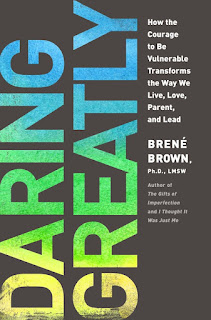Being Enough: Shame and Cultures of Scarcity
http://experimentaltheology.blogspot.com/2013/02/being-enough-shame-and-cultures-of.html
Last week in my post Good Enough I argued that our cultural success ethos is based upon a lie, a delusional anthropology, a false conception of who we are. Specifically, I argued that our success ethos presumes that we are gods rather than finite creatures. The success ethos--believing we are gods--presumes that we have inexhaustible resources of time, energy and talent that can be leveraged into greater and greater success, improvement, betterment, and excellence.But we aren't gods and we don't have inexhaustible resources. We are finite. We have limits. Only so much energy. Only so many hours in the day.
But still the call for more, more, more. Better, better, better. And as I argued last week, the only way for a finite creature to give more, more, more or get better, better, better is to make greater and greater sacrifices. To spread the butter a little more thinly. Maybe it is family that is sacrificed. Maybe it's your health. Or sleep. But in the end something is going to suffer or break if we, as finite creatures, keep pretending that we are gods.
After writing that post a few months ago I started reading Brené Brown's new book Daring Greatly. You may know Brown from her TED talks. Her talks about vulnerability and shame have become two of the most popular TED talks of all time. Highly recommended if you've not seen them.
In Daring Greatly Brown makes an argument very similar to the one I made last week. Brown is an expert in shame and at the start of Daring Greatly she tries to get to the root of the problem. Why are so many of us struggling with shame and feelings of worthlessness?
Brown argues that we are living in what she calls a "culture of scarcity." For example, she asks participants in her studies to answer the question: "What do you hear or see in the phrase: Never ________ enough." Brown writes:
It only takes a few seconds before people fill in the blanks with their own tapes:She concludes: "We get scarcity because we live it." There is never enough. Brown goes on to elaborate:
- Never good enough
- Never perfect enough
- Never thin enough
- Never powerful enough
- Never smart enough
- Never certain enough
- Never safe enough
- Never extraordinary enough
Scarcity is the "never enough" problem. The word scarce is from the Old Norman French scars, meaning "restricted in quantity" (c. 1300). Scarcity thrives in a culture where everyone is hyperaware of lack. Everything from safety and love to money and resources feels restricted and lacking. We spend inordinate amounts of time calculating how much we have, want, and don't have, and how much everyone else has, needs, and wants.What is the source of this experience of lack? Brown traces it back to the very things I was describing last week:
What makes the constant assessing and comparing so self-defeating is that we are often comparing our lives, our marriages, our families, and our communities to unattainable, media-driven visions of perfection, or we're holding up our reality against our own fictional account of how great someone else has it.Driven by these lies--"visions of perfection," "fictional accounts"--we create what Brown calls a "shame-prone culture" where many within the culture struggle with feelings of worthiness, feelings rooted in feeling a failure, feeling not good enough.
So how to address the problem? Brown argues that the solution isn't to replace scarcity with abundance. Again, as I argued last week, that just plays back into the delusions of the culture, that we are living in Eden, as god-like beings with a cornucopia of resources. Brown argues that the solution to scarcity isn't abundance but enough. "Knowing," as Brown writes, "that I am enough."
But to be "enough" is to to become vulnerable, to expose our weakness, insecurities, and failures to ourselves and others. To be vulnerable is to stop living the lie of god-like perfection and to stop maintaining that illusion before the eyes of others.
But that is difficult and fearful thing to do in our shame-prone culture where god-like delusions of excellence and perfection rule. As I argued last week, we are fearful of exposing our finitude to ourselves and others. Brown roots these fears in shame. Building upon the word of Ernest Becker, I tend to root the anxiety and shame in more foundational mortality fears, as a symptom of our slavery to the fear of death:
Hebrews 2.14-15:Regardless, both Brown and I agree that the solution to all this is learning to be a vulnerable human being. Learning to overcome shame by embracing our failures and limitations.
Since the children have flesh and blood, he too shared in their humanity so that by his death he might break the power of him who holds the power of death—that is, the devil—and free those who all their lives were held in slavery by their fear of death.
Learning to say that being a human being is good enough.

Comments
Post a Comment